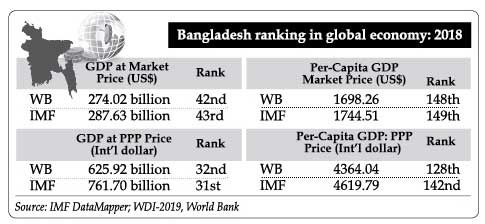Ranking in global economy is something many countries, especially the developing ones, consider critical to portray their economic strength. Different bodies and organisations prepare such rankings using the data of the World Bank or the International Monetary Fund (IMF).
The latest data of the World Bank showed that some changes have taken place in the global economic ranking of countries. Based on Gross Domestic Product (GDP) at current or market price in 2018, India slipped to seventh position from fifth in 2017. So, the country is now deemed as the seventh largest economy in the world. The size of the Indian economy is estimated at US$2.72 trillion. United Kingdom (UK) and France lagged behind India in 2017, but have now moved ahead of India claiming fifth and sixth positions respectively.
According to the World Bank's list, world's top economy in 2018 was the USA with a GDP of $20.5 trillion. The USA was followed by China ($13.6 trillion), Japan ($4.9 trillion) and Germany ($3.9 trillion). These four countries retained their positions of 2017.

The World Bank data indicate a promising picture of Bangladesh economy. The country's ranking in terms of global GDP has jumped by two steps, placing it at the position of 42nd largest economy of the world in 2018. In 2017, Bangladesh was placed at 44th position in terms of market price GDP. The data show that the size of Bangladesh's GDP increased to $274.02 billion in the past year which was $249.72 billion in 2017. Thus the economy grew by 9.73 per cent in current US dollar terms.
Moving ahead in the global GDP ranking is good news. It reflects expansion of economic activities of the country, helps improve its brand value and is likely to attract investors to put some of their stakes for better return. According to the data released by United Nations Conference on Trade and Development (UNCTAD), net inflow of FDI (foreign direct investment) in Bangladesh stood at $3.61 billion in 2018 by registering around 68 per cent growth over $2.15 billion in 2017.
A number of factors, however, affect the change in ranking of a country. Besides its own economic performance, performances of the peer countries also contribute to the change. Despite maintaining robust growth, a country may trail behind another country if the second one posts a big jump in growth rate. Differences in calculation or estimation method in different international institutions may also change the ranking of a country moderately. For instance, according to IMF, Bangladesh ranked 43rd in 2018 having nominal GDP worth $286.27 billion. The slight difference of the GDP data between the World Bank and IMF is probably due to exchange rate calculation.
Again, in terms of GPD at Purchasing Power Parity (PPP), Bangladesh ranked 31st among 192 nations in the past year, as per IMF estimation. PPP tries to find the real value of a currency vis-à-vis the US dollar. It compares economic productivity and standards of living among countries. Though difficult to compute, it provides relatively better picture of an economy than that on the basis of market price of US dollar. Thus, PPP conversion factor is the number of units of a country's currency required to buy the same quantities of goods and services in the domestic market as US dollar would buy in the US market. According to the World Bank estimate, 31.96 Bangladeshi taka was equal to 1 US Dollar in terms of purchasing power in 2018. In other words, for Bangladesh it requires 31.96 Local Currency Unit (LCU) to purchase one international dollar or PPP dollar.
It is thus important to put the advancement of ranking into perspective. Though the 42nd largest economy, Bangladesh is a country of more than 160 million people, ranking as the eighth largest country in terms of population. The large number of population makes per capita income tiny and the country's ranking, too, falls drastically.
In 2018, Bangladesh ranked 142nd in terms of per capita GDP based on PPP. The per capita GDP was estimated at PPP $4619.79, according to IMF. In terms of per capita GDP at PPP, Qatar ranked top of the list though in terms of market price GDP, the Gulf country trailed behind Bangladesh and ranked 54th. It will be grossly misleading to term Bangladesh as more developed than Qatar, if compared in terms of the size of the economy. Per capita income is a better indicator than nominal GDP.
Moreover, economic ranking in terms of GDP size and per capita income show partial picture of the sustainable development of an economy. How the higher growth and incremental size of an economy is making the lives of the people better is reflected in the Human Development Index (HDI), prepared by United Nations Development Programme (UNDP). In HDI of 2017, the latest so far, Bangladesh ranked 136th among 189 countries and was considered as a country with medium human development. India, the third largest economy in terms of PPP-GDP, ranked 130th in HDI. China, the largest economy in terms of PPP-GDP, ranked 86 in HDI and was considered as a country with high human development.
No doubt, persistent economic growth helps a country improve the quality of lives. China is an example in this regard as it not only focuses on growth, but also on human development. During 2012-2017, the country's rank in HDI improved by seven notches. Bangladesh also recorded seven-notch advancement in HDI during the period. It thus indicates that a country's growth strategy must not lose focus on human development.


